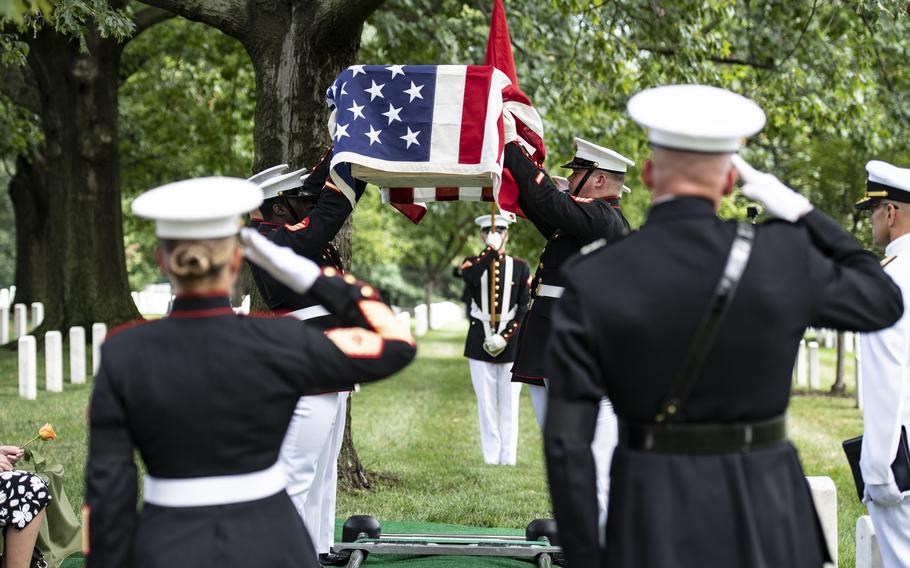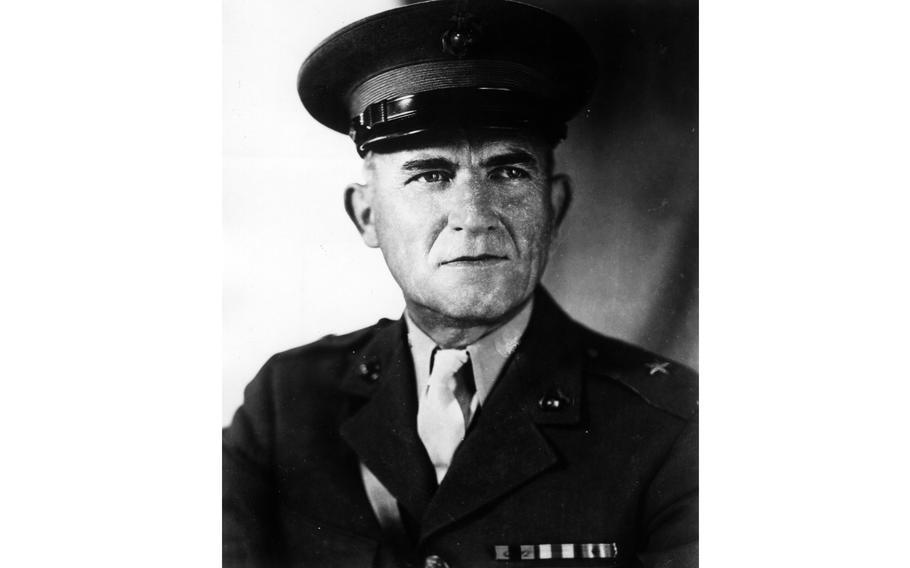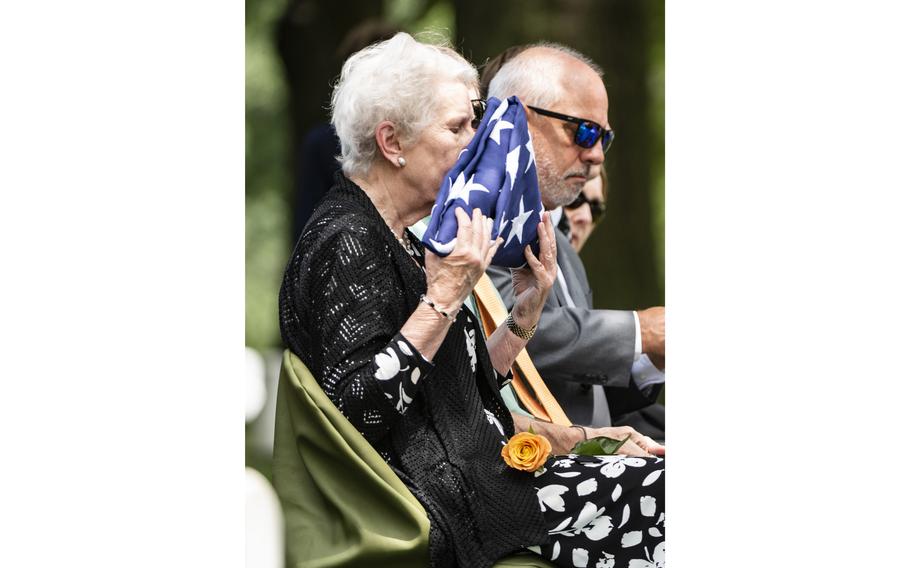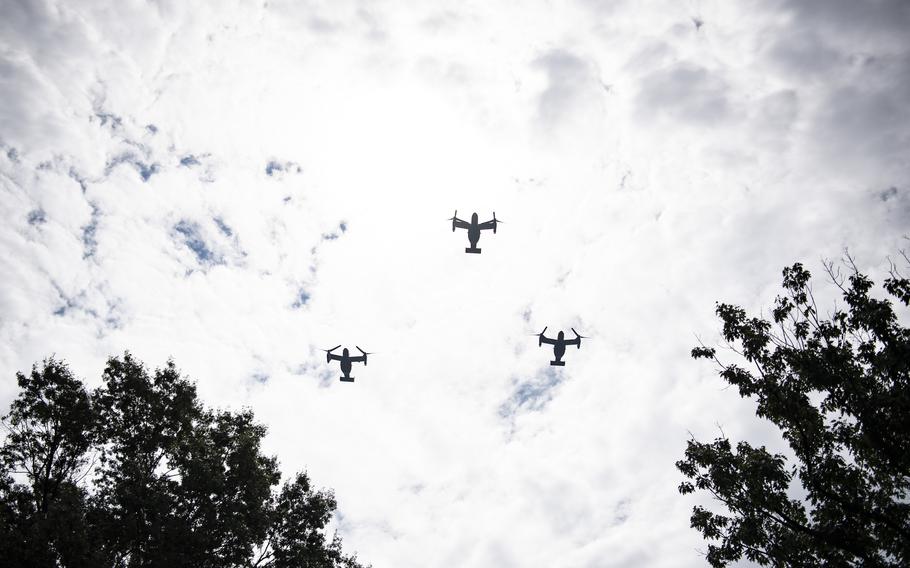
Marines from the “The President’s Own” Marine Band conduct military honors with a funeral escort for Marine Corps Maj. Gen. Harry Pickett at Arlington National Cemetery, Arlington, Va., July 19, 2023. (Elizabeth Fraser/Arlington National Cemetery/U.S. Army)
The remains of a Marine Corps general who fought in World War I and II that had been buried for decades in India are now interred at Arlington National Cemetery, marking the end of a long saga for his family.
“Today, we bring a hero to these hallowed grounds remembered by his family, to the Marine Corps he loved and the nation that owes him a debt of gratitude,” Rear. Adm. Carey Cash, a Navy chaplain, told dozens of relatives and friends gathered at Arlington for the reinterment ceremony. “He was a good man, a fine soldier and a great Marine. After six decades, [he] has finally come home.”

Marine Maj. Gen. Harry Pickett, pictured here in a 1942 photo, fought in World War I and World War II and was honored with the Legion of Merit award for “exceptionally meritorious conduct.” (U.S. Marine Corps)
Maj. Gen. Harry Kleinbeck Pickett was buried with full military honors at the cemetery just outside Washington on July 19. The ceremony involved service members from the United States Marine Band and the service’s Washington barracks. After the service, Pickett’s casket was given an official funeral escort to his plot in Section 52, which is in the northeastern corner of the historic cemetery not far from the U.S. Marine Corps War Memorial.
At the end of the ceremony, cannons were fired to honor Pickett’s 31 years of service and three V-22 Osprey aircraft flew overhead. Also, a firing party shot three volleys and a bugler sounded taps. Pickett’s granddaughter Sandra Sharpe received the American flag that draped Pickett’s casket.

Sandra Sharpe kisses the U.S. flag from the funeral service for Sharpe’s grandfather, Marine Corps Maj. Gen. Harry Pickett, at Arlington National Cemetery, Arlington, Va., July 19, 2023. (Elizabeth Fraser/Arlington National Cemetery/U.S. Army)
Marine Maj. Gen. Roger Turner said “Semper Fi” — the Marine Corps motto that means “always faithful” — has special meaning in Pickett’s case.
“We saw it played out today in reality, 58 years later,” Turner, the Marines’ acting deputy commandant for plans, policy and operations, said at the burial service.
Born in Ridgeway, S.C., in 1888, Pickett attended The Citadel military college and later joined the Marines at 25. In the years that followed, he served on Guam, where in 1917 he participated in the capture of the German boat SMS Cormoran just after the U.S. entered World War I. Many years later, on Dec. 7, 1941, he was the commanding officer at the Pearl Harbor Marine barracks when hundreds of Japanese planes launched a surprise attack that forced the U.S. into World War II. During the aerial assault, Pickett and his Marines fired on enemy planes with small arms. For his actions, he was awarded the Legion of Merit — an honor given for “exceptionally meritorious conduct.”

Three V-22 Osprey aircraft flew overhead at the funeral service for Marine Corps Maj. Gen. Harry Pickett at Arlington National Cemetery, Arlington, Va., July 19, 2023. (Elizabeth Fraser/Arlington National Cemetery/U.S. Army)
While on vacation in West Bengal, India, in 1965, Pickett died of a heart attack at the age of 77 and his remains would stay buried there for decades. Later, when the family sought to bring them home, it became a time-consuming and complex procedure, partly because pinpointing the grave’s exact location was tough — the headstone had long been stolen. Also, getting the necessary permits and approvals from the Indian government proved to be a lengthy process.
“So happy that we accomplished the mission in getting a great American hero home and getting the long overdue honors he was so deserving of,” said Bob Mebane, a retired Army Nurse Corps officer and fellow Citadel graduate who worked for years to help Pickett’s family find the remains. “For me, it’s an enormous sense of satisfaction and elation. It was also a great team effort.”
Pickett’s remains were given an official sendoff ceremony in India in May that was attended by U.S. and Indian officials.